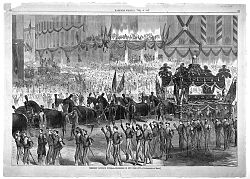Background
Walt Whitman and Abraham Lincoln
Although they never met, Whitman saw Abraham Lincoln several times between 1861 and 1865, sometimes in close quarters. The first time was when Lincoln stopped in New York City in 1861 on his way to Washington. Whitman noticed the President-elect's "striking appearance" and "unpretentious dignity", and trusted Lincoln's "supernatural tact" and "idiomatic Western genius". [1] [2] He admired the President, writing in October 1863, "I love the President personally." Whitman considered himself and Lincoln to be "afloat in the same stream" and "rooted in the same ground". [1] [2] Whitman and Lincoln shared similar views on slavery and the Union, and similarities have been noted in their literary styles and inspirations. Whitman later declared that "Lincoln gets almost nearer me than anybody else." [1] [2]
There is an account of Lincoln reading Whitman's Leaves of Grass poetry collection in his office, and another of the President saying "Well, he looks like a man!" upon seeing Whitman in Washington, D.C., but these accounts are probably fictitious. Lincoln's death on April 15, 1865, greatly moved Whitman, who wrote several poems in tribute to the fallen President. "O Captain! My Captain!", "When Lilacs Last in the Dooryard Bloom'd", "Hush'd Be the Camps To-Day", and "This Dust Was Once the Man" were all written as sequels to Drum-Taps . The poems do not specifically mention Lincoln, although they turn the assassination of the President into a sort of martyrdom. [1] [2]
Writing and publication
Whitman was home in Brooklyn on a break from his job with the Department of the Interior when he heard of Lincoln's assassination. He recalled that, although breakfast was served, the family did not eat and "not a word was spoken all day". He heard a similar story that troops under William Tecumseh Sherman on their homeward march were loud and jubilant until they heard the news about Lincoln, which stunned them into silence.
Although the poem is narrated from the point of view of a witness of Lincoln lying in state, Whitman himself likely didn't see it personally. The original subtitle of the poem included "April 19", the date Lincoln's coffin was on display in the East Wing of the White House, but Whitman did not leave Brooklyn for Washington, D. C. until April 24. He therefore also missed the ceremonies in New York when Lincoln's body was there on April 24.
The first poem that Whitman wrote on Lincoln's assassination was "Hush'd Be the Camps To-Day", which was dated April 19, 1865—the day of Lincoln's funeral in Washington. [a] [7] Although Drum-Taps had already begun the process of being published on April 1, Whitman felt it would be incomplete without a poem on Lincoln's death and hastily added "Hush'd Be the Camps To-Day". William Coyle, in his book The Poet and the President, gives a formal publication date of May 4, 1865, for the poem. It was later republished in the 1871 edition of Leaves of Grass in the "Memories of President Lincoln" cluster. Several commas were removed and the fourth stanza was revised.
Reception and analysis
This short poem values collectivity—in the voice it adopts, in the rituals it devises. It not only values—more than all pomp-filled state memorials—the love borne by the common soldiers, but it also views poetry as merely one ingredient in an indigenous ritual, devised by the people for the people.
Although the poem is not particularly well known, it was Whitman's first response to Lincoln's death, and the scholar Gregory Eiselein considers it to have many of the defining characteristics of Whitman's elegies to the fallen president. Eiselein particularly notes how the poem "mourns for the dead but celebrates death", considers Lincoln's death as a moment that will bring peace, and remembers Lincoln "not because he was a great leader or conqueror but because he was well-loved". By not naming Lincoln and comparing him to every soldier who died in the war, Whitman extends the elegy to all soldiers. [10] The critic Helen Vendler considers "Hush'd" to be written from the collective voice of the Union Army mourning their commander. She argues that it demonstrates "omnimobility" of words by travelling from the camps to Lincoln's burial site. [7]
The scholar Gay Wilson Allen considered "Hush'd" to be written "hastily" as Whitman's tribute to Lincoln's funeral. Whitman's biographer Justin Kaplan called "Hush'd" a "stop press insertion". Peter J. Bellis agreed, writing that "Hush'd Be the Camps To-Day", as Whitman's first elegy to Lincoln, "seeks both to describe and to perform that burial, to make itself the physical and narrative endpoint of the nation’s grief". "Hush'd Be The Camps To-Day" has inaccuracies and what scholar Ted Genoways describes as "stock form"; Whitman was unsatisfied by it. Allen argues that this poem was not "the elegy he [Whitman] felt was needed", and neither was "My Captain!" Throughout the summer Whitman developed his feelings on the assassination as he wrote "Lilacs", which represented the fitting elegy and was one of Whitman's greatest expressive works. Vendler noted that "Hush'd" is an instance of Whitman subordinating himself and writing as someone else.
In 1943, Henry Seidel Canby wrote that Whitman's poems on Lincoln have become known as "the poems of Lincoln". William E. Barton wrote in 1928 that neither "This Dust Was Once the Man" nor "Hush'd be the Camps" "would have attracted much attention at the time or have added anything later to the poet's reputation".
This page is based on this
Wikipedia article Text is available under the
CC BY-SA 4.0 license; additional terms may apply.
Images, videos and audio are available under their respective licenses.


